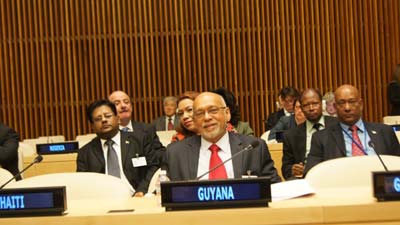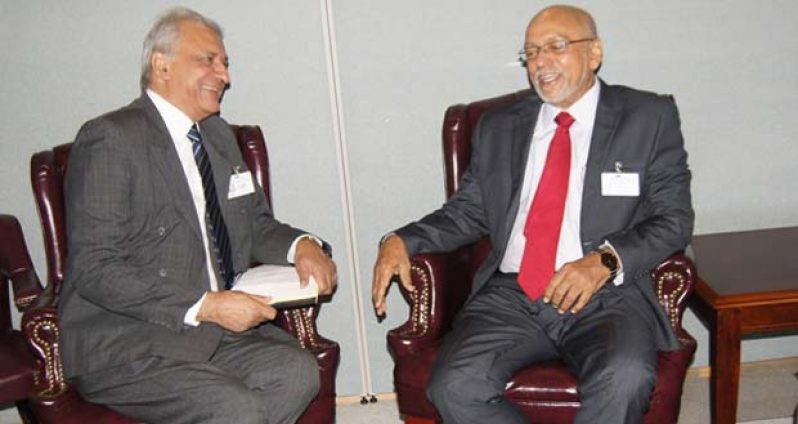‘Solutions to Climate Change demand requisite political will’
THE challenges of the prevailing climate change phenomenon will only be resolved if there is the political will to find the much needed solutions, President Donald Ramotar told world leaders yesterday.

“There must be a strong focus on the reality that the solutions to climate change can only be realised with requisite political will,” he said while addressing the United Nation’s 2014 Climate Summit.
According to him, the knowledge and power to avert climate change related catastrophes exists, but the international community has been unable to muster the political will to tackle the problem in a meaningful way.
“The international community is yet to summon the political will to turn this knowledge into meaningful action,” the President said. “We must use our presence as Heads of State and Government at this Summit to bring focus on the reality that the solutions to climate change can only be realised with requisite political will.” .
CALL TO ACTION
To this end, the Head of State issued a call to action, in light of the impending 2015 agreement deadline. “In the fifteen months to Paris, we must ensure that a number of things are done,” he said.
The 2015 agreement is a new one that is expected to be adopted in 2015, at the Paris climate conference, and implemented from 2020. It is expected to take the form of a Protocol, another legal instrument or ‘an agreed outcome with legal force’, and will be applicable to all Parties. It is being negotiated through a process known as the Durban Platform for Enhanced Action.
The remaining actions that have to be taken, according to the Guyanese leader, include deeper cuts in emissions by industrialised countries, as part of their contribution to the 2015 agreement.
‘Developing countries are ready to take actions to develop along low-carbon and climate resilient paths, but the global financial system makes such actions difficult. Those countries most responsible for this climate change problem must take the lead in supporting those that are most vulnerable and least responsible’ — President Donald Ramotar
Mr. Ramotar said, “Pledges since Copenhagen have been weak and insufficient and will see us falling significantly short of the goal we have set ourselves.”
Secondly, he pointed to the willingness of developing countries to take action; a willingness that is restricted by limitations in resources.
“Developing countries are ready to take actions to develop along low-carbon and climate resilient paths, but the global financial system makes such actions difficult. Those countries most responsible for this climate change problem must take the lead in supporting those which are most vulnerable and least responsible,” the President said.
Mr. Ramotar recommended the search for methods that will generate large flows of assistance to the developing world, or methods to provide better incentives for low carbon development.
The Guyanese leader also highlighted the “tragic erosion” of trust since Copenhagen, with many developed countries failing to make their financial pledges a reality. “It is vital that the Green Climate Fund be capitalised urgently and at the scale required and furthermore that it be made fully operational no later than 2015,” he said.
Finally, he referred to the fact that forests can offer up to 20 per cent of the climate solution, once the right financial incentives are in place.
The President said, “We cannot achieve the two degree goal without REDD+. The last COP in Warsaw delivered a REDD Plus decision for an international framework for payments. What remains now is for the financing to be made available to implement REDD Plus in forested countries. Such a financing scheme must include payments for ecosystem services.”
GUYANA IS COMMITTED
Additionally, Mr. Ramotar made clear Guyana’s commitment to advance effective action to both mitigate and adapt to climate change. “We are committed to action and have been acting for many years now,” he said.
The President pointed to Guyana’s ambitious Low-Carbon Development Strategy, which was launched in 2009, as evidence of this commitment.
Under the LCDS, a new development path has been set out; one that is based on deploying Guyana’s forests to mitigate global climate change, while using the benefits to enable low carbon development, improving climate change resilience and enabling national development.
“The Guyana-Norway partnership has provided the impetus to move the LCDS forward, but more such partnerships are needed,” he said.
Also, under the LCDS work has also been advanced in the area of renewable energy and in creating sustainable, low-carbon livelihoods for communities.
The President said, “We have also mainstreamed climate change across the entire policy matrix. As a low-lying coastal state, we are particularly vulnerable to devastating climate change impacts. Adaptation activities and building resilience to improve our ability to cope are indispensable elements of our climate strategy.”
However, he reiterated the need for firm financial commitments, which are essential to the success of Guyana’s ongoing efforts. “(These efforts) must be significantly increased to facilitate broad-scale deployment and allow their long-term sustainability,” he said.
Mr. Ramotar expressed confidence that Guyana’s move to implement the menu of measures to mitigate and adapt to climate change will see the country averting a catastrophe.
“We are far from achieving a less-than-two-degrees climate target, and our world is heading for climate catastrophe. If this continues, it will reverse development progress and destroy the lives and livelihoods of future generations,” he opined.
(By Vanessa Narine)



.jpg)









